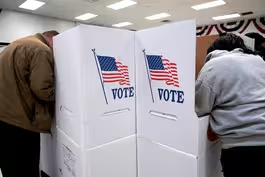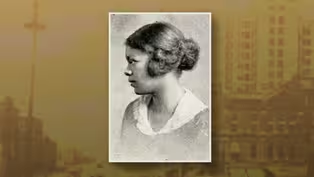
Fear, violence and chaos grip Haiti as gangs seize control
Clip: 2/4/2023 | 8m 36sVideo has Closed Captions
Fear, violence and chaos grip Haiti as gangs seize control
The island nation of Haiti has moved closer to the brink of collapse. Heavily armed gangs have taken over the capital and are targeting police after the country has been without a single elected official since early January. Jacqueline Charles, the Miami Herald's Caribbean correspondent, joins John Yang to discuss what she saw on a recent trip to Haiti.
Problems playing video? | Closed Captioning Feedback
Problems playing video? | Closed Captioning Feedback
Major corporate funding for the PBS News Hour is provided by BDO, BNSF, Consumer Cellular, American Cruise Lines, and Raymond James. Funding for the PBS NewsHour Weekend is provided by...

Fear, violence and chaos grip Haiti as gangs seize control
Clip: 2/4/2023 | 8m 36sVideo has Closed Captions
The island nation of Haiti has moved closer to the brink of collapse. Heavily armed gangs have taken over the capital and are targeting police after the country has been without a single elected official since early January. Jacqueline Charles, the Miami Herald's Caribbean correspondent, joins John Yang to discuss what she saw on a recent trip to Haiti.
Problems playing video? | Closed Captioning Feedback
How to Watch PBS News Hour
PBS News Hour is available to stream on pbs.org and the free PBS App, available on iPhone, Apple TV, Android TV, Android smartphones, Amazon Fire TV, Amazon Fire Tablet, Roku, Samsung Smart TV, and Vizio.
Providing Support for PBS.org
Learn Moreabout PBS online sponsorshipJOHN YANG: The island nation of Haiti is moving closer to the brink of collapse.
Since early January, the country was left without a single elected official, leaving heavily armed gangs to be in control.
Today, much of the capital, Port-au-Prince, is under the control of gangs that have been targeting police.
And Haitians are living in fear and chaos.
At a funeral in Port-au-Prince, the families of three fallen police officers grieved as their colleagues solemnly saluted their flag draped coffins.
In the last month, gangs have killed nearly 20 officers.
Mourners lamented the lives lost and the turmoil that has engulfed the country.
UNIDENTIFIED MALE (through translator): Our police officers are being slain again.
We will not accept that bandits rule and that they say that the government is theirs.
JOHN YANG: Elsewhere in the capital, rage armed protesters, some dressed in police gear, set fires in the streets, broke through the gates of the airport, and lowered the flags to half-staff to mark the deaths.
UNIDENTIFIED MALE (through translator): There has to be a revolution.
There has to be a bloodbath.
All these policemen have been killed, and the Prime Minister has not reacted.
JOHN YANG: Violent protests have persisted for months, and many Haitians are angry that the government can't keep them safe.
UNIDENTIFIED MALE (through translator): We've been suffering for a long time.
People are dying of bullets.
My mother, my child and my sister, we will not be able to continue.
JOHN YANG: The term of Prime Minister, Ariel Henry, who was appointed to office, expired February 2022, but he has yet to schedule new elections.
UNIDENTIFIED MALE TL (through translator): No one voted for him.
He was not elected.
He has no legitimacy.
He has no right.
Ariel Henry is not the president.
JOHN YANG: With no president, no legislative quorum, and the high court dysfunctional lawlessness reigns, the U.N. estimates that gangs control more than half of Port-au-Prince.
Late last year, the U.N. imposed sanctions one of the most powerful gang leaders.
Jimmy Cherizier, a former police officer known as Barbecue.
He's accused of numerous atrocities, including massacres and sexual violence.
But Cherizier considers himself the lesser evil.
JIMMY "BARBECUE" CHERIZIER, Gang Leader (through translator): You and your country, if you were living in these conditions, if you saw the conditions in which our people are living in, wouldn't you revolt?
JOHN YANG: Haiti and the U.N. have called for international peacekeepers to bolster the country's beleaguered police force.
ANTONIO RODRIGUE, Permanent Representative of Haiti to The United Nations (through translator): It is our obligation to act fast.
If we overcome the gangs, we will restore order and peace.
JOHN YANG: But far, only Jamaica has offered to help, leaving Haiti to fall deeper into chaos.
Earlier, I spoke with Jacqueline Charles, who is the Miami Herald's Caribbean Correspondent.
I asked her what she saw on her recent trip to Haiti.
JACQUELINE CHARLES, The Miami Herald: I had two very different trips to Haiti, which, you know, is crazy.
The first trip, I went to north part of the country to Cap-Haitien, the historic capital of Haiti.
And I went for an international jazz festival.
Yes, the jazz festival in Haiti.
Fast forward, a couple of days later, this time I'm in Port-au-Prince.
I go as part of an imbed with the United States and it is chaos.
It's protest, and it's police who are protesting.
And they're armed.
They are putting up barricades.
You're blocking roads.
We were coming right off of the latest killings of police officers.
There have been 14 just in the month of January, 78 according to a local human rights group since July, when interim Prime Minister Ariel Henry came to power.
So, you know, police officers were enraged, but they were joined in these protests also by fired cops as well as gang members, according to sources who I spoke to.
So, all of that just tells you about the volatility of this country.
That one minute, you know, you could be walking into the city and enjoying beautiful jazz and then the next minute the streets are blowing up.
Because those protests were also in the north, the very places where I was just walking freely just a few days earlier.
JOHN YANG: Who's in charge of Port-au-Prince?
Who controls the city?
JACQUELINE CHARLES: Well, that depends on who you ask, right?
The United Nations will tell you that today gangs are in control of over 60% of the capital, including where the U.S. embassy is located.
That embassy is located between two gang strongholds.
Haiti today does not have one elected official.
The country has 12 million people.
As your audience may recall that the President was assassinated in July 2021.
And then in January, the last ten remaining elected members of parliament, their mandates expired.
They were there.
They couldn't really do anything.
They weren't enough to hold a quorum.
But symbolically, at least, you said there were ten elected people.
Well, today there's not one.
There are no elected mayors, no local officials.
There's been ongoing debate and differences in terms of, you know, who should be in charge, who should take control of this country.
What should it look like?
Should there be a long transition, or should it be a rush to elections?
JOHN YANG: Why are the police the target?
JACQUELINE CHARLES: The reality is that you have a country today with a police force.
It's like one fourth side of the NYPD.
Basically 9000 police officers who are active duty, ready to go at any particular moment.
And they're not all in Port-au-Prince.
They have been trying to battle the gangs, but it's very difficult for them to sustain any of those wins that they have.
I mean, kidnapping last year went up 104%, according to the U.N. That was, you know, one kidnapping every 6 hours.
The homicide rate also climbed 35.2%.
I mean, this is the reality the Haitians are living, but today their top and number one concern is safety.
JOHN YANG: And we've seen Haitians trying to flee this turmoil and this chaos.
What are they doing?
How are they trying to get out?
JACQUELINE CHARLES: They're not trying to.
They are actually doing it.
You know, the Biden administration recently announced a two-year parole program for four countries, including Haiti.
And as long as somebody has a sponsor in the United States, and that sponsor is able to show that they have a financial ability to take care of someone and they pass a background check and the person in Haiti has a valid passport, then they're being paroled in.
And what we're seeing is this long lines of people, including police officers, hundreds of police officers, have applied for passports so that they can qualify for this program.
I mean, everybody wants to leave the country.
And so those who are committed to the country are saying, you know, who will help us rebuild?
Because for them, this chaos cannot last forever.
JOHN YANG: What's it going to take to restore order?
And is that within sight?
JACQUELINE CHARLES: Well, the interim government has asked for the deployment of a multinational international force to basically assist the Haitian National Police in combating the gangs.
You know, everybody I talk to will tell you that this is a police force that's very well trained, but they don't have the equipment.
And when I talk about equipment, I mean something as basic as ballistic vests.
I did a ride along, an end with the police last year shortly after a massacre in a particular community.
They took me out, and I saw young guys just fresh out of the police academy standing guard about a mile down from, you know, the U.S. Embassy.
And they did not have a vest.
Or if they had a vest, there was not a bulletproof plate that was in there.
And of course, they're underpaid, and so they really need help.
But of course, this has become a very political issue, right?
The United States supports this request, but it doesn't want to lead this force.
Its request -- it's ask Canada to take the lead.
We have not officially heard anything from Canada yet.
Jamaica just recently said that they would be willing to participate.
When you think about the Caribbean region, they actually have the experience.
Their defense force, their military actually do anti-gang raids or operations alongside the police.
But, you know, that is what everybody is waiting for to see if that's going to happen.
But also, just when you talk about Haiti, we say, you know, Haitians say, what is it going to take?
This very question that you are asking, they are also asking because it's like, what is rock bottom?
How bad do things need to get?
And when I tell you that things right now are bad, they really are.
JOHN YANG: Jacqueline Charles of the Miami Herald, thank you very much.
JACQUELINE CHARLES: Thank you.
Expert warns of AI tools’ potential threat to democracy
Video has Closed Captions
Clip: 2/4/2023 | 6m 7s | Security expert warns of AI tools’ potential threat to democracy (6m 7s)
How a trailblazing Black lawyer took down a top mafia boss
Video has Closed Captions
Clip: 2/4/2023 | 5m 24s | How a trailblazing Black lawyer took down a top New York City mafia boss (5m 24s)
Providing Support for PBS.org
Learn Moreabout PBS online sponsorship
- News and Public Affairs

FRONTLINE is investigative journalism that questions, explains and changes our world.

- News and Public Affairs

BREAKING the DEADLOCK sparks bold, civil debate on America’s toughest issues.
Urban Consulate Presents











Support for PBS provided by:
Major corporate funding for the PBS News Hour is provided by BDO, BNSF, Consumer Cellular, American Cruise Lines, and Raymond James. Funding for the PBS NewsHour Weekend is provided by...

